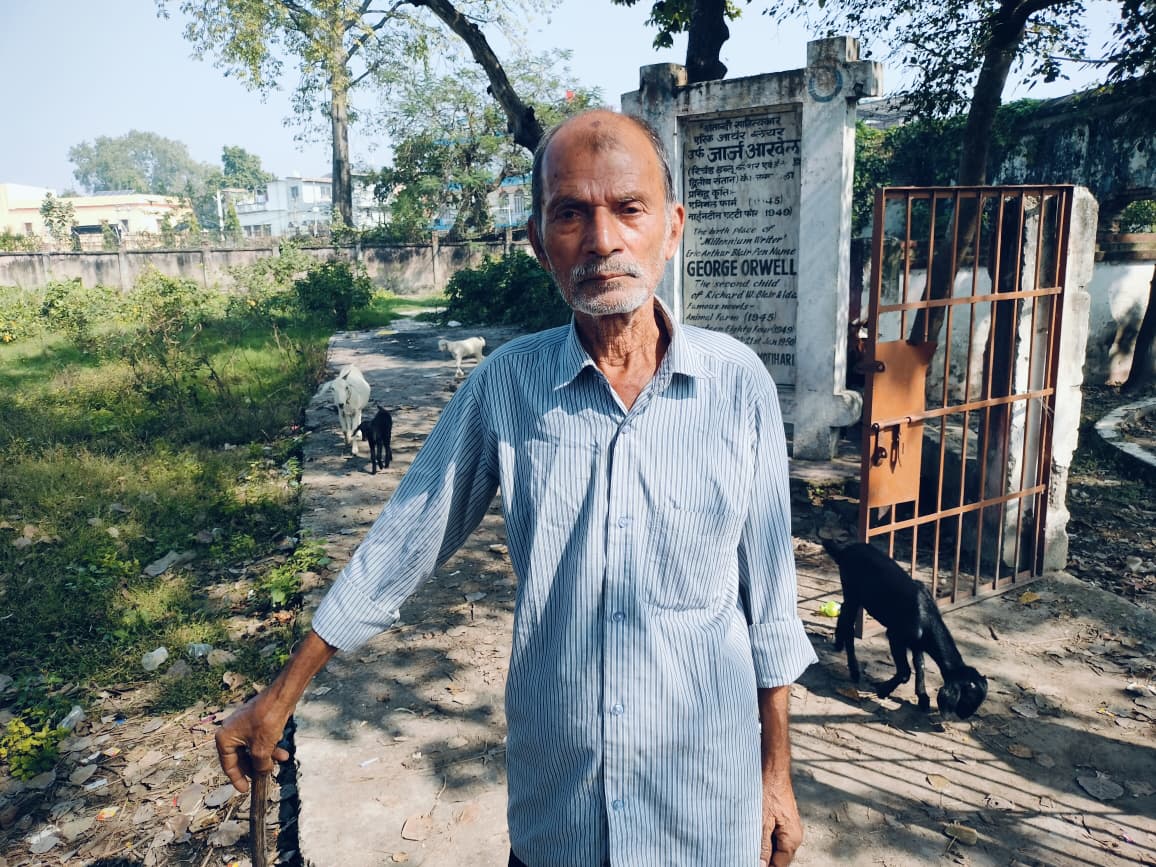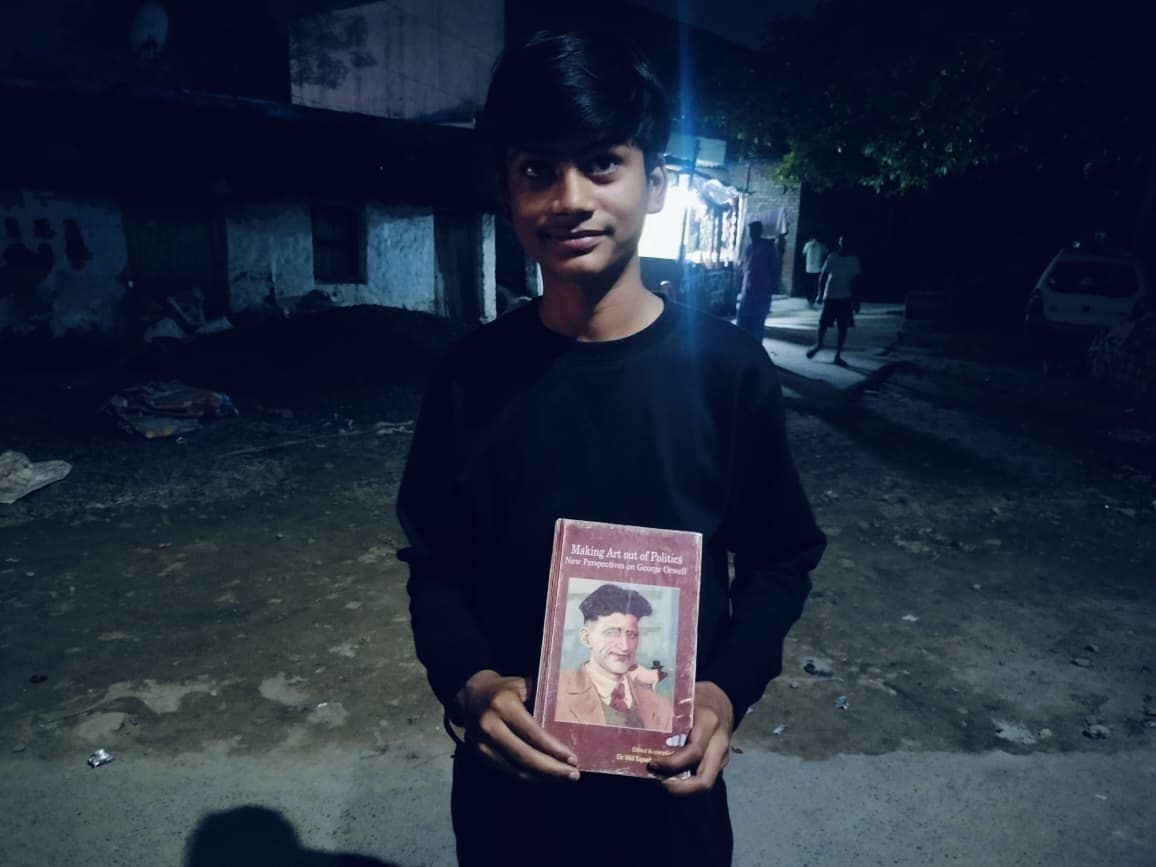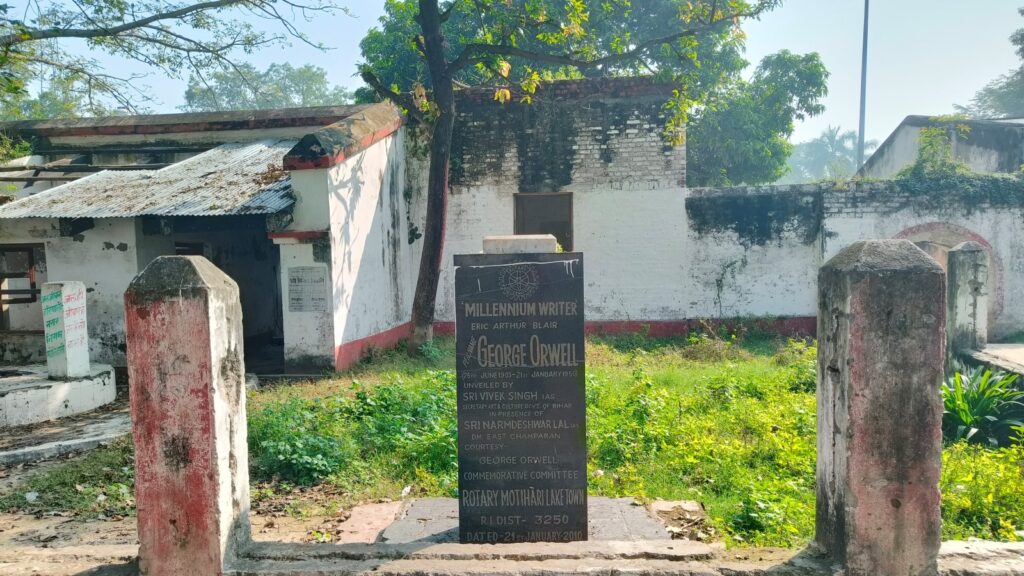The one-kilometre stretch passing through the bustling market in Motihari Chowk in Bihar’s East Champaran district honours the legacy of three stalwarts who left an imprint on the politics and philosophy of democratic socialism: Mahatma Gandhi, Ram Manohar Lohia, and George Orwell.
The statues of Gandhi and Lohia are by this road that also houses the birthplace of Orwell, the celebrated author of 1984 and Animal Farm, works which provided the world with language to think about and describe totalitarian regimes, coining phrases such as Big Brother, Thought Police, Doublethink, and Ministry of Truth. Yet, in the midst of the ongoing elections, where campaigning concludes on Sunday, all three appear to have been abandoned.
The Orwell house is a protected structure under the Ancient Monuments (Protection) Act, 1976, with a a solitary stone plaque at the entrance announcing to anyone who cares to visit that this is where Orwell, whose real name was Eric Arthur Blair, was born on June 25, 1903, to Richard Blair, a British official in the Opium Department, and Ida Limouzin Blair. Orwell himself had no memory of the house as his mother returned to England with him and his sister the following year.
 Bhola Meena says that the building is Motihari’s heritage, it should be restored.
Bhola Meena says that the building is Motihari’s heritage, it should be restored.
The house underwent significant renovation around a decade ago, but is now in a state of utter disrepair, with a rusting iron gate, a front yard overrun by weeds, partially collapsed roofs, cracked plaster, and the rooms full of faecal matter and insects. A bust of the author that had been installed in the front yard during the renovation was defaced. The iron railings around the house are either broken or have been removed. Now, the compound serves as a playground for children, a grazing field for animals, or a dwelling for pigs in the area.
Goat herder Bhola Meena begins his day as usual, taking his animals to the Owell home to graze. “Bahut bura lagta hai ye buiding dekh ke, ye hamari dharohar hai, hume ise bachana chahiye (I feel terrible seeing the state of this house, this is our heritage, we must save it). A lot of foreigners come here, what will they think of us?” says the 77-year-old, adding that locals broke the railings and Orwell’s bust.
The house is surrounded on four sides by a college, a park, a village of the Dalit Dom community, and a high school. While no one visits it, the park is one of the few public spaces in Motihari that is bustling with visitors.
Shravan Kumar, a Class 9 student, says the building would have remained in one piece had there been a security guard. “There was a guard here, but as soon as he left, the whole area turned upside down,” he says.
 “My grandfather gave me this book,” says Harsh Kumar, a Class 8 student, smiling. “I haven’t read it yet. I don’t understand much of it. But I know he is a very famous person.”
“My grandfather gave me this book,” says Harsh Kumar, a Class 8 student, smiling. “I haven’t read it yet. I don’t understand much of it. But I know he is a very famous person.”
State Department of Arts, Culture, and Youth official Dr Ajay Kumar Singh says the government has not been able to get around to restoring the heritage structure because “a lot of restoration work is ongoing across the state and the workload is high”, adding that they will look into the matter.
Local Ram Kumar Dom, an 18-year-old who will vote for the first time, says he does not know who Orwell is except that once the police had come to the area when “somebody broke the murti”. Asked which way he is leaning, he says, “I cannot tell who I will vote for. But I know one thing. Lalu ji gave respect to the poor.”
On one side of the park, called the Satyagraha Park, sisters Khushi and Suman Kumari have come to spend the afternoon since their teacher did not turn up that day. Neither has ever crossed over to see the Orwell house. “I have not thought about politics much yet. But I like Nitish Kumar, he gave us a bicycle. I want to go outside Motihari to study. There is not much to learn here,” says Khushi, who is in Class 12.
Near the Orwell house, a group of political science students in a huddle worry that their semester admission has been delayed yet again, putting the completion of their course in jeopardy. None of them recalls hearing about the writer. They have more pressing concerns. “The delay has become a norm now. Our fourth-semester admission should have been completed in April. But it has still not been over even today. In Bihar, the future scares the youth. Caste has surpassed everything. Only caste has gained significance over the years, hence parties engage in social engineering. But, who will fix the broken education system?” asks Randeep Kumar, one of the students.
Motihari is a BJP stronghold, having been won by former state Law Minister Pramod Kumar since 2005. Last time around, Kumar polled almost half the votes (he secured 49.44%), while the RJD finished second with 41.63%. This time, the Opposition party has fielded 35-year-old Dewa Gupta against the veteran.
As the bright afternoon light begins to fade, the political loudspeakers grow a little quieter. Soon, a person arrives to close the gate that serves as the entry point to both the park and the house. Around two hundred metres away, two children run up and one of them says, “I know who Orwell is.” He quickly goes inside his house and brings back a book that has Orwell’s photo on the cover. It is titled Making Art out of Politics: New Perspectives on George Orwell.
“My grandfather gave me this book,” says Harsh Kumar, a Class 8 student, smiling. “I haven’t read it yet. I don’t understand much of it. But I know he is a very famous person.”

